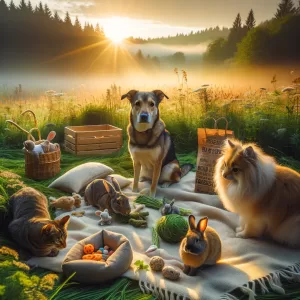Parrots, renowned for their vibrant colors and exceptional mimicry abilities, are also recognized for their intricate social behaviors and cooperative nature. Among these behaviors, the role of foragers within a parrot flock stands out as a key survival strategy. These birds undertake the significant task of locating food sources, ensuring the survival and health of the flock. This blog post explores the role of foragers in parrot flocks, their responsibilities, and the importance of this shared responsibility for the well-being of the flock.
Chapter 1: The Role of Foragers:
Food is a necessity for survival. For a parrot flock, finding sufficient food is a major task that is undertaken by some of its members known as foragers. These birds venture out, often in small groups, with the specific task of locating food sources. Depending on the species and their specific diets, they seek out fruits, seeds, nectar, and sometimes even small insects.
Chapter 2: The Importance of Communication:
Once a substantial food source is found, the foragers’ role transcends the simple act of gathering food. They communicate their find to the rest of the flock, often through specific calls or signals. This communication is not arbitrary; each call can carry specific information about the location and nature of the food source. This shared information ensures that the whole flock can benefit from the find, emphasizing the cooperative nature of these birds.
Chapter 3: The Cooperative Nature of Parrots:
The role of foragers in a parrot flock underscores the cooperative nature of these birds. By sharing information about food sources, parrots ensure that all members of the flock have access to food. This cooperation is not just about survival; it is a fundamental aspect of parrot social structure, fostering unity and strengthening social bonds within the flock.
__
The role of foragers in parrot flocks offers a fascinating glimpse into the cooperative nature and survival strategies of these colorful birds. By sharing the responsibility of finding food and communicating valuable information to the flock, parrots demonstrate a level of cooperation and social organization that is truly remarkable. As we continue to study and understand these behaviors, we gain a deeper appreciation of these fascinating creatures. This knowledge can guide conservation efforts and inform how we care for parrots in captivity, emphasizing the need to respect their natural behaviors and social structures. Indeed, the world of parrots is filled with social intricacies and cooperative behaviors that continue to captivate us.








